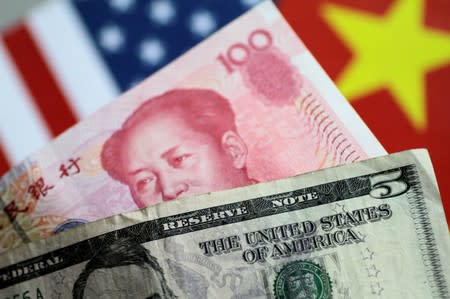U.S. branding of China as currency manipulator offers few new remedies

By David Lawder
WASHINGTON (Reuters) - Formally declaring China a currency manipulator may scratch a long-term itch for U.S. President Donald Trump, but the move provides few new tools that have not already been employed in two years of trade negotiations with Beijing.
U.S. Treasury Secretary Steven Mnuchin issued the declaration late on Monday, after China's central bank let the yuan slip below the psychologically important level of seven yuan to the dollar.
The move marks the first manipulator designation since 1994, when China was declared a manipulator.
The main purpose of such designations under a 1988 U.S. currency law was to force negotiations with the offending country over their foreign exchange practices, but the United States and China have been locked in comprehensive trade negotiations -- including on currency issues -- for more than two years without result.
It is difficult to see how a designation will change the situation other than fanning trade and currency war flames, said Mark Sobel, a former senior U.S. Treasury and IMF official who worked on monetary issues.
"There's not much here. The remedies are very weak and the IMF already said what it thinks about the yuan," said Sobel, who now works with the Official Monetary and Financial Institutions Forum, a London-based think tank.
The IMF said last month that the yuan's valuation was in line with China's softer economic fundamentals, though the dollar was overvalued by 6% to 12%.
WHAT HAPPENS NEXT
If a country is found to be manipulating its currency for a trade advantage, Treasury is required by law to enter bilateral negotiations with that country or work through the International Monetary Fund to correct the situation. The aim is to eliminate any unfair advantage brought on by the unfairly devalued currency.
If no solution can be found, the president can impose various penalties such as banning Overseas Private Investment Corp financing in that country or excluding it from U.S. government procurement contracts.
China is neither a major recipient of government contracts nor financing from OPIC, which is positioning itself with $60 billion in new funding to better compete with China's own Belt and Road infrastructure development initiative.
Trump promised during his 2016 election campaign that he would declare China a currency manipulator on "day one" of his presidency. But for over two years, Mnuchin declined to do so in the Treasury's semi-annual currency reports, relying on criteria that showed China's global current account surplus was shrinking and that the yuan level was largely stable after a major drop in 2015.
In May, China was again spared a manipulator designation, even with tighter new criteria specifying that global current account surpluses should not exceed 2% of gross domestic product as trade talks continued.
TALKING WITH CHINA
Even during the mid-2000s, when China's yuan was widely viewed to be significantly undervalued and its current account surplus approached 10% of GDP, the United States refrained from a currency manipulator designation.
At the time, China and the George W. Bush administration were already engaged in bilateral talks on currency and other broad trade and economic reform issues called the Strategic Economic Dialogue. The dialogue was continued and renamed under President Barack Obama and has since been derided by Trump as ineffective.
When the U.S. Congress first enacted a currency review law in 1988, there were few international forums for resolving such disputes, well before the launch of the World Trade Organization. The Treasury declared Taiwan and South Korea manipulators that year, and slapped China with such a declaration in 1994.
A report by the U.S. congressional Government Accountability office found that all three countries in subsequent negotiations with the United States made substantial reforms to their foreign exchange regimes and saw the manipulator designation lifted.
China unified its dual exchange rate system in 1994 after the last designation, and has since pegged the value of its currency to the U.S. dollar.
(Reporting by David Lawder and Andrea Shalal; Editing by Lisa Shumaker)